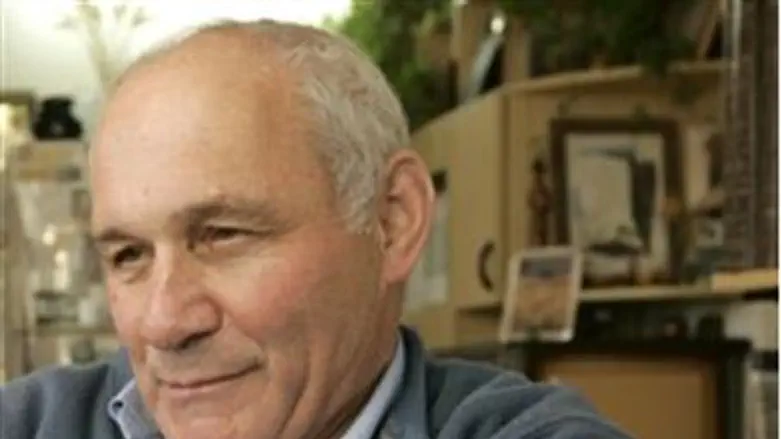
On Wednesday, Israel will mark Yom Yerushalayim (Jerusalem Day), the 44th anniversary of Israel’s liberation of the Holy City during the 1967 Six Day War.
During a special interview with Arutz Sheva’s Hebrew website on Sunday, Rabbi and former MK Chanan Porat, who participated in the liberation of Jerusalem, recalled the time period and explained why he joyfully celebrates Yom Yerushalayim.
How do you celebrate this day?
“First and foremost, I celebrate! I don’t listen to those who say that maybe it was some kind of temporary episode. The redemption of Jerusalem is a complete redemption, even if it has its ups and downs.
“Weaknesses could lead to things being unrecognized by us, but the truth is that Jerusalem is eternal. Anyone with eyes in his head should be unbelievably joyful. And if there are Jews who think this truth has had its day – it has not – and Jerusalem is eternal.”
What do you remember from the 1967 period of Jerusalem’s liberation?
“We did not know that Jerusalem is about to be facing salvation and is about to redeem herself. It was a war of survival against the arrogant Egyptian President, who spoke about a war of annihilation and Jihad.”
Rabbi Porat recalled that his unit was actually headed towards the Sinai Peninsula. “The same morning that we were supposed to land on the outskirts of El-Arish to prevent the Egyptian army from carrying out its plan to reach Tel Aviv, it was announced that [Jordanian King] Hussein had joined the war and began to bomb Jerusalem. It was decided to change all the plans and go up to Jerusalem. It was no longer a war to defend our existence but a war over Jerusalem, a war of redemption.
“We rode in the dusty buses in roundabout ways to avoid meeting with the enemy. Suddenly we felt as if we’re going back to Jerusalem and in hoarse voices we started singing ‘Jerusalem of Gold.’ This feeling, this recognition that there is a switch happening, that the struggle for existence is becoming a war of redemption, gave us renewed strength.
“We went up to Mount Scopus and then to the Mount of Olives, with the intent of reaching the Temple Mount. On the way to Mount Scopus the company commander Giora Ashkenazi, who was near me, took a bullet in the head and fell bleeding. At first I was stunned, and then the deputy company commander shouted at me: ‘Chanan, you cannot stop! We must continue!’ I continued to run. So we continued with one eye crying and one eye laughing. We went to the Temple Mount and felt as though a light shone upon us; it was redemption uplifting us alongside the terrible pain over the loss of Giora and loved ones like him who were dear to us.
“This was the great message of the Six Day War - the redemption of Jerusalem, for which we prayed while we were at the Western Wall.”
What was the feeling when you entered the Temple Mount?
“Truthfully, on the one hand we had the great privilege of getting to the Temple Mount, but on the other hand we were not yet ready to understand the significance of regaining the Temple Mount.
“At one time, [noted Israeli independence fighter and philosopher] Israel Eldad told me: ‘I have some criticism of you. You stood on the Temple Mount and asked where the Western Wall was. You made a historic shortcut. Instead of staying on the Temple Mount where our Temple stood, you asked where the Western Wall was [the remnant of the wall around the Temple Mount, ed].
“It was a very fair question and very difficult test,” admitted Rabbi Porat, “I told him: ‘You're right, but in fact this was not a shortcut, we were simply not prepared for the spiritual level of the Temple Mount, for the possibilities that had opened up, we did not yet recognize that we need to stand on the Temple Mount and take steps to rebuilding the Temple.
Rabbi Porat concluded by saying: “Although we have not yet reached the inside of the holy mountain, we’re on the right track. We must educate about the city’s holiness and this is not simple, but I am happy that there is a precious public with a strong desire and love for Jerusalem, even if they cannot build it in practice.
“Our hearts are filled with joy and may we have the privilege to see the Levites standing in the Temple hall and singing a special song for Yom Yerushalayim.”
Rabbi Chanan Porat is the beloved ideological icon of the Gush Emunim settlement movement, whose faith led a generation of young lovers of the Land of Israel to settle Judea and Samaria after the Six Day War.
He is also a popular lecturer, teacher, and prolific writer of Torah insights which appeared weekly in a flier called “M’at Mind Ha’or” (a bit of light, ed.), and have since been published in book form.

